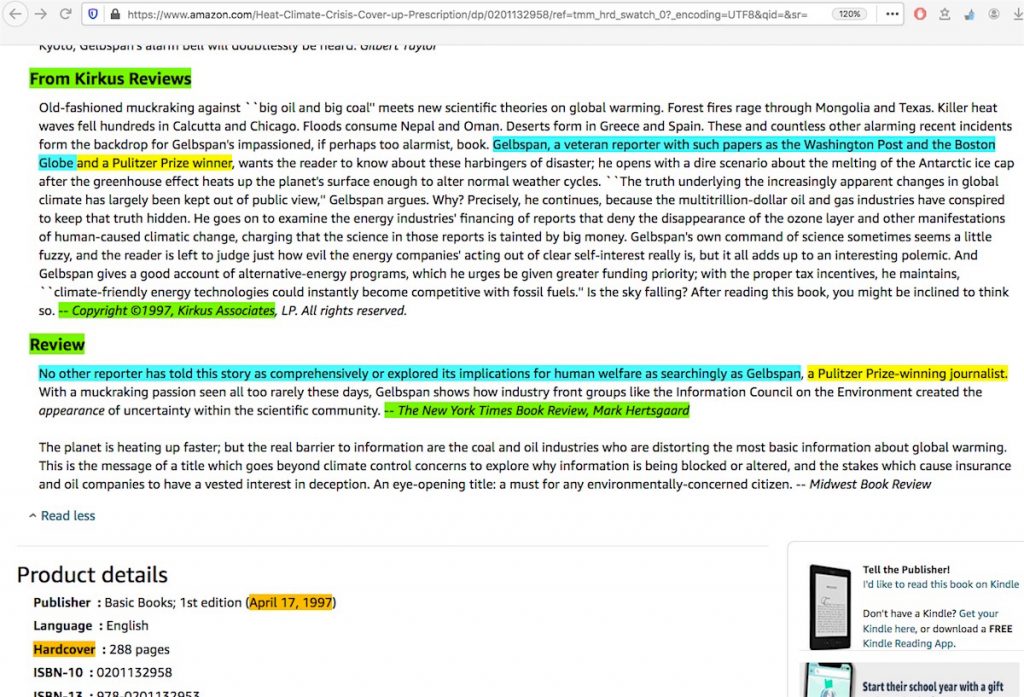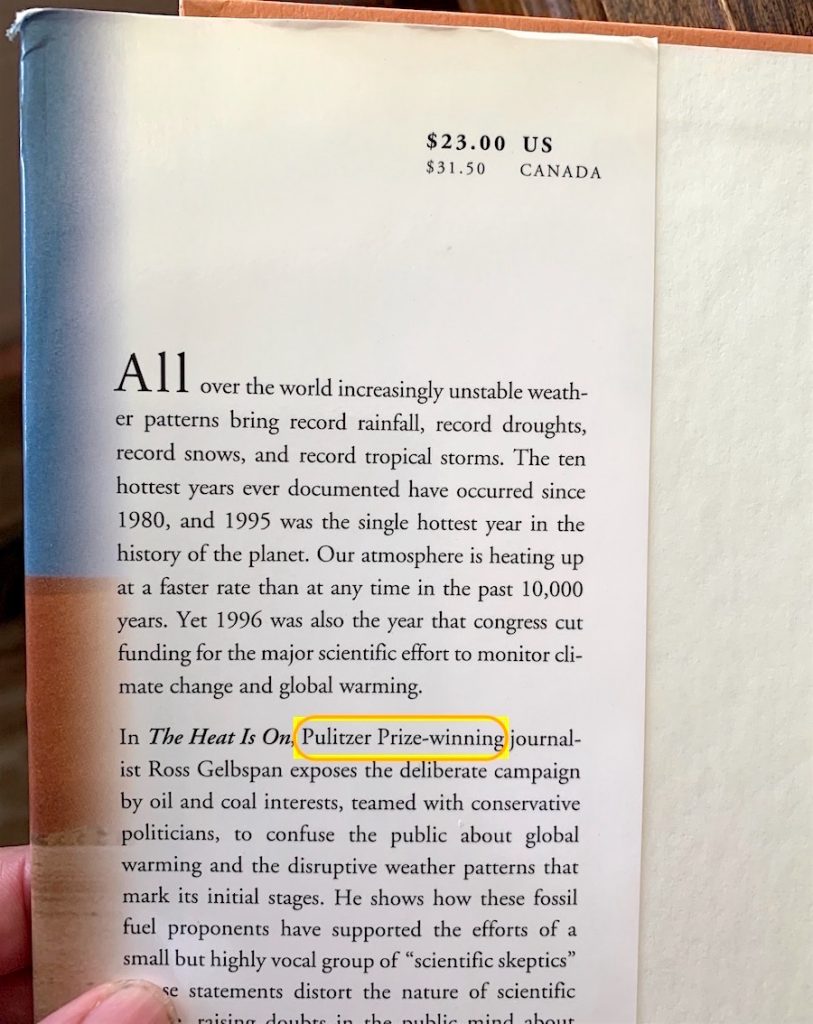An authoritative portrayal like that simply begs for the question, “when is ‘journalism’ nothing more than environmental issue propagandizing?”
And the other question that arises from it is, “Is that all you have as a go-to source for the ‘crooked skeptic climate scientists’ accusation?”
The glowing portrayal of Ross Gelbspan came up just a week ago on August 4th at the Mongabay ‘world’s most popular rainforest information site,’ one that I had never heard of before, which seems to cater more toward the huge Indonesian / Philippines public, but claims to have a base of reporters that spans the entire globe. Within the site’s widely viewed lengthy article, “A world of hurt: 2021 climate disasters raise alarm over food security,” Ross Gelbspan is credited under the subsection “Climate chaos breeds food insecurity and political instability” with predicting that exact situation …..
Prescient journalist Ross Gelbspan, writing in 1997, warned the world of the perpetual “coming state of emergency,” a deepening and disruptive climate change abyss — an extreme weather maelstrom into which food production systems, whole populations, governments and countries would fall and fail, bringing hunger, human misery, civil unrest and war.
….. but the best evidence the article could come up with for climate-induced civil unrest was the “Arab Spring” situation, where in some analysis of it elsewhere, the word “climate” and anything related to that is never even mentioned as a root cause. A tough question objective reporters might ask about the Mongabay article’s ‘evidence’ is how the Arab Spring uprising could be distinctly differentiated from innumerable previous uprisings in that general Middle East region dating back to biblical times.
But there is a more elemental reporting problem here.
Look among the pages of Mongabay’s leadership team and you see some form of the words journalism or journalist eleven times, and among their staff list, the words appear 60 times, including two of them in the bio for the co-writer of the article mentioning “journalist Ross Gelbspan …” where the link in the article for the words “writing in 1997” goes to Amazon’s page for Gelbspan’s “The Heat is On” book.
In 1997 — and I will correct it here if anyone can prove this otherwise — Ross Gelbspan was not a working journalist at any news outlet or as a freelance journalist for anybody. His own self-description was that he retired from that field in 1992.
That’s an elemental error of reporting on the part of the Mongabay ‘journalist,’ it gives a false impression because it isn’t just a gray area of semantics. Do you expect a particular police officer to arrive at your car accident scene to take a report / place an appointment with a particular dentist / are stunned by the absence of a particular baseball player on your favorite team, when each of those individuals has been retired for the last five years? She’s a former police officer / he’s a retired dentist / he was a player and is now a play-by-play baseball game announcer.
Next, while the link for Gelbspan’s “The Heat is On” book is no more than a link by itself, the Mongabay ‘journalist’ only really needed to either quote the larger text in its fuller context within a block quote, or perhaps go the further step to have an additional photo link of the book page the way I do at this blog. Problem is, the quote is not a direct quote, it’s a paraphrase of the title of Gelbspan’s entire Chapter Seven, “The Coming Permanent State of Emergency.”
Had the Mongabay ‘journalist’ chosen to do so, he could have selected several passages out of the chapter to either demonstrate Gelbspan’s ‘prescience’ …. or to turn 180° and ask a hard-nosed reporter-style question on how Gelbspan was able to support particular declarations. Like the one I jotted down in my copy (among myriad others throughout my reading of it) on the bit concerning Chinese cropland erosion.
Meanwhile, click on the Mongabay article’s link for the words “writing in 1997,” and if you are fast enough to spot it before the page is automatically overlaid with a sample view of the book’s cover and several pages scanned from it, you see this: “September 22, 1998”
Did the Mongabay ‘journalist’ mistype the year, putting one more error into his brief mention of Gelbspan? Not exactly, the link goes to Amazon’s page for the 1998 paperback version of Gelbspan’s 1997 hardcover version, which includes an impressive biographical note about his editorial participation in a Pulitzer-winning series of unnamed articles — hold that image and thought for a moment. The Mongabay ‘journalist’ could have very easily linked to that 1997 hardcover at Amazon, like this.
When you go to that particular Amazon page version and take the one additional step of clicking on its “Read more” downarrow, you can scroll down to the point where, contradicting the above impressive bio note statement, two reviewers of the book state unequivocally that Ross Gelbspan won a Pulitzer Prize outright.

Where did those two reviewers, especially the NYT book reviewer Mark Hertsgaard get the info to make such a declaration? Not from the Pulitzer organization itself, which shows Gelbspan never won a Pulitzer. They read that claim on the book jacket’s inside front sleeve for Gelbspan’s 1997 hardcover.

Since the Mongabay ‘journalist’ brought up the topic of Gelbspan’s 24 year-old hardcover book, it’s safe to assume he knows much about it, but the question is, does he or did he own a personal copy of it, and if so, did he accept that declaration about the Pulitzer Prize without question? After all, it’s a goal of most any genuine U.S. journalist to win that top prize based on the merits of their own reporting, thus they should be livid at any non-winner trying to pass himself or herself off as a Pulitzer winner, and/or should at least minimally curious to see what other narratives such a person might be fabricating.
I brought up that sort of lack of intellectual journalistic curiosity just recently in my July 20, 2021 blog post and I emphasized on it in my ‘Bill Clinton could have changed the course of history’ blog post where I suggested that real journalists could have asked tough questions about Ross Gelbspan even if Clinton did not.
I focus on this because it can’t be emphasized enough: we have every appearance in the world of epic instances of journalistic malfeasance happening in this issue. Considering the depth of assessments of one type or another offered by skeptic climate scientists and raw data analyst experts who rebut what’s put out in the IPCC climate reports, and the sheer lack of news media consideration given to those skeptics, combined with Ross Gelbspan’s / “Greenpeace USA née Ozone Action’s” hugely questionable and basically unsupportable efforts to smear the credibility of those skeptics, it is inexcusable for so-called ‘journalists’ to overlook or ignore all the faults with the science, and overlook or ignore all the massive, easily spotted faults in the political side of the ‘man-caused global warming issue.’
When does ‘journalism’ have every appearance of being nothing more than environmental issue propagandizing? It’s when Ross Gelbspan is brought up yet again for the umpteenth time to bolster an argument about the certainty of catastrophic man-caused global warming in a maneuver that’s arguably a veiled effort to direct readers to the smear of skeptic scientists.
And the global warming issue is a case study on how mainstream media journalistic malfeasance is detrimental to so many other hugely controversial news topics which are dividing the country right now.
